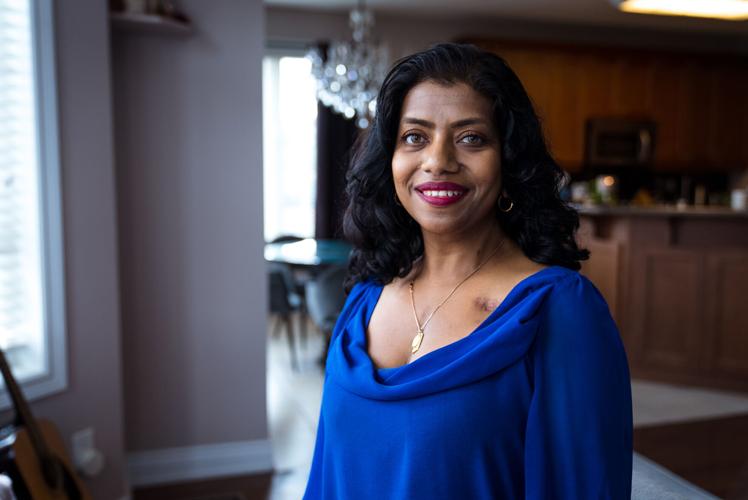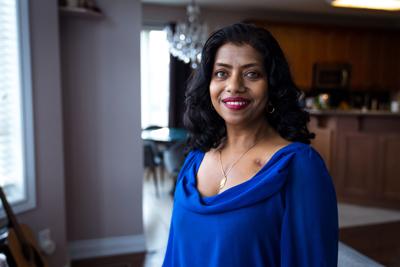Five days after giving birth to her son in 2005, Michelle Rambarran had a heart attack â and ended up spending her 30th birthday in the ICU. Thatâs when it was discovered she had a ruptured left ventricle that collapsed while she was breastfeeding, triggering the heart attack.
âMy heart was damaged by around 80 per cent,â said Rambarran. At that point, she was referred to University Health Networkâs (UHNâs) Peter Munk Cardiac Centre, located at pc28čÙÍűGeneral Hospital, where she found out that she might need a heart transplant.
âI was extremely shocked,â she said. âHere I am, a new mother, and all of a sudden that whole world kind of flipped upside down.â
That first year was tough. âI honestly didnât think I would live to see my sonâs first birthday,â she said.
Rambarran was in and out of the hospital; she spent more time there than she did at home with her husband and newborn. It was hard to breathe or walk. âWhen I was at home, I was told not to carry my son, and I had to wait for someone to actually put him in my arms for me to be able to hold him,â she said.
In September 2007, she was put on a heart transplant waitlist after it became clear that her heart was getting weaker. It was just after Valentineâs Day in 2008 when she was admitted to the hospital for LVAD (Left Ventricular Assist Device) surgery, in which a mechanical pump is implanted to assist the heartâs left ventricle in pumping blood. This serves as a âbridgeâ to a heart transplant.
After almost two years on the waitlist, Rambarran received what would turn out to be her first heart transplant at UHNâs Ajmera Transplant Centre.
The surgery went well, and once she recovered, she was able to walk up a flight of stairs without panting. She could pick up her son. Two years after her surgery, she was able to go back to work.

Michelle Rambarran and her familyÂ
ContributedBut after about 12 years, things again took a turn for the worse. âI realized while running for the GO train that I was completely out of breath â it took a while for my breath to come back to normal. And thatâs when I thought, okay, somethingâs not right.â
In 2019, Rambarran found out she had developed coronary artery disease, which is a common occurrence in heart transplant patients. Over time, the arteries that supply blood to the heart become blocked, causing the person to struggle with breathing and potentially leading to another heart attack.
That meant another heart transplant.
Rambarran remembers it clearly, because her family loves the pc28čÙÍűRaptors, and she was back in the hospital the day after the Raptors won their first NBA conference finals on June 13, 2019. Then, she was back on the heart transplant waitlist.
It was 2020 when she got a call to come in for her second transplant â right at the beginning of the COVID-19 pandemic.
Being on a waitlist means you can get a call at any moment â and everything else falls to the wayside. âI remember thinking that we just ordered Italian food and I didnât get to eat my gnocchi with my family,â said Rambarran.
This time it was a very different experience. Both her parents had passed away â and they had been a big part of her support system. Then, of course, there was the pandemic. âI had to say my goodbyes to my husband and my son outside the hospital because they werenât allowed in,â she said.
The second heart transplant was much more challenging, which can be the case with second transplants. Her kidneys failed and she needed dialysis. She also developed diabetes. This time, she spent about a month recovering in the hospital. When she was finally able to go home, one of the first things she did was order gnocchi with her family.
âThis time around, I was using a walker for quite a while before I got the strength in my legs again,â said Rambarran. âI still have my good days and bad days. But I am grateful Iâm still here. I still get to watch my son grow up.â
Not only did Rambarran live to see her sonâs first birthday, she lived to see him graduate high school; heâs now in his second year of university.
Sheâs also found a new support system through HeartLinks, a patient support network for heart transplant patients at pc28čÙÍűGeneral Hospital. HeartLinks, which got its start in 1988, gives patients a space to share their experience with others whoâve been through it too â and to celebrate milestones. Today, UHN performs about 40 heart transplants every year, the most in Canada.
Rambarran went from using a walker after her second heart transplant to training for a 5 kilometre walk as part of We Walk UHNITED presented by Rogers, a family-friendly, accessible fundraising walk in support of UHN, taking place on May 31, 2025. The HeartLinks group has formed a team for the walk â and Rambarran is captain.
Donations help UHN â the top hospital in Canada and top publicly funded hospital in the world â drive innovation, purchase state-of-the-art equipment and recruit and retain the best and brightest medical minds.
While the walk will raise funds for UHN, itâs also a celebration.
Before her second transplant, Rambarran was barely able to walk five steps without having to stop and catch her breath. âSo being able to walk like this is amazing,â she said. Other heart transplant patients, as well as friends, family members and healthcare workers, are also participating in the walk to raise funds for UHN.
But for Rambarran, itâs also about âmaking sure the organ donors know how grateful we are for them and their families,â she said. âWe also want to recognize and give back to the people who saved our lives. If those donors hadnât made those decisions, we wouldnât be here today.â
The walk route will pass four of UHNâs downtown sites and culminate in a block-party-style celebration outside pc28čÙÍűGeneral Hospital, with food, live entertainment and family-friendly activities.
Nathalie Lacoste-Hofmann is also taking part in the walk as part of the HeartLinks team.
âHaving a heart transplant, even if youâve been a patient all your life, is not a walk in the park,â she said. âIt changes you physically and also psychologically.â
With HeartLinks, she can share her experience with others whoâve had a similar journey, which helps to abate the feeling that no one can understand what sheâs gone through. âHaving friends who also struggle with the effects of medication and other such things helps you understand that whatever you feel is normal,â said Lacoste-Hofmann.
As a congenital heart patient, UHNâs innovative approach has allowed her to live a relatively normal life, even with multiple arrhythmias throughout her 20s and early 30s.
âUHN has made my dream of being a mother a reality, with my son being born in 2002. UHN has also made it possible for me to be the mother to my beautiful, adopted daughter,â she said.
âSo many people are helped by the research, innovation and kindness that goes on at UHN hospitals,â she added. âpc28čÙÍűGeneral Hospital has been united with me in my walk through life, so I canât help but walk UHNITED with UHN and UHN Foundation to help ensure they keep shining on and helping others.â
No one ever changed the world on their own, but when we walk UHNITED we can. Register today at




























